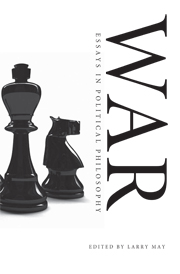Book contents
- Frontmatter
- Contents
- Contributors
- Introduction
- I HISTORICAL BACKGROUND
- II INITIATING WAR
- III WAGING WAR
- 7 Proportionality and Necessity
- 8 Collateral Damage
- 9 Weapons of Mass Destruction: Are They Morally Special?
- 10 Justifying Torture as an Act of War
- 11 On Terrorism: Definition, Defense, and Women
- IV ENDING WAR
- Bibliography
- Index
9 - Weapons of Mass Destruction: Are They Morally Special?
Published online by Cambridge University Press: 05 June 2012
- Frontmatter
- Contents
- Contributors
- Introduction
- I HISTORICAL BACKGROUND
- II INITIATING WAR
- III WAGING WAR
- 7 Proportionality and Necessity
- 8 Collateral Damage
- 9 Weapons of Mass Destruction: Are They Morally Special?
- 10 Justifying Torture as an Act of War
- 11 On Terrorism: Definition, Defense, and Women
- IV ENDING WAR
- Bibliography
- Index
Summary
Weapons of mass destruction (WMD), traditionally understood to consist of nuclear, biological, and chemical weapons, have been singled out for special moral and legal opprobrium. Their status under international law is distinct from that of other weapons, that is, conventional weapons. Under international treaty, the possession of chemical and biological weapons is prohibited. Nuclear weapons have a somewhat different legal status, in that their possession is not outlawed, at least for the major nuclear powers, but there are important legal restrictions on their use. On the assumption, however, that ethics should inform law, I want to consider WMD from a moral rather than a legal perspective. Is the moral opprobrium with which WMD are regarded justified? Are these weapons morally special, and, if so, in what way?
Destructiveness
A good place to begin is with a different question. Is the traditional concept of WMD as consisting of nuclear, biological, and chemical weapons adequate? Is it appropriate to conflate nuclear, biological, and chemical weapons into a single category? Is the use of this single expression to represent all three kinds of weapons coherent and useful; does it make sense? If we can determine that they should be grouped together, and this grouping is due to a distinctive morally relevant property that they share, then we may have an answer to the question whether and how WMD are morally special. Many have raised questions about the propriety of this grouping. Some argue that “WMD” should be “deconflated.
- Type
- Chapter
- Information
- WarEssays in Political Philosophy, pp. 165 - 186Publisher: Cambridge University PressPrint publication year: 2008

